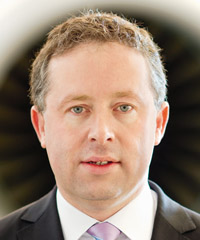News Backgrounder
Battle joined “Down Under” with no peace in sight
Australia’s two major airlines, Qantas Airways and Virgin Australia, are suddenly in pitched battle about ownership, with “The Flying Kangaroo” boss seeking support from the country’s prime minister in the dispute.
December 1st 2013
Qantas Group chief executive, Alan Joyce, has unleashed a fierce public – and political - campaign intended to halt the expanded foreign ownership portfolio of his airline rival. Read More »
 |
 |
| Qantas Group boss, Alan Joyce, accuses Virgin Australia boss, John Borghetti, of operating an unfair playing field by introducing foreign-owned airline equity into Virgin Australia that does not have to conform to the same government regulations as Qantas | |
In a November letter to the Australian prime minister, Tony Abbott, and transport heads at both state and national governments, Joyce accused Virgin of orchestrating its “virtual takeover” by foreign airlines. He went further and said the carriers are intent on destroying Qantas.
The fierce Qantas campaign was provoked by Virgin Australia’s capital raising of A$350 million (US$329 million), planned for launch at press time. Joyce claimed the capital raising would cause potentially damaging shifts in Australia’s aviation industry. And, that the strategy involved “predatory” acts by state-owned airlines to undercut Qantas, cripple it domestically and take over its routes.
The “state-owned airlines” are current shareholders in Virgin Australia, Singapore Airlines (SIA), Air New Zealand and Etihad Airways. They were all expected to increase their equity in Virgin Australia via the capital raising. Etihad was committed to a maximum holding of 22.2%, SIA to 22.1% and Air New Zealand, which is sub-underwriting the offer by up to $35.2m, to add to its pre-capital raising approved equity, to 25.9%. The UK’s Virgin Atlantic group will retain its present 10%.
The row erupted as Qantas appeared to be heading to another loss-making year, with fears its credit rating could be downgraded. Joyce’s campaign has ignited a national debate over the future ownership of the Australian national carrier, including speculation, now debunked, that the government would invest in Qantas.
Prime Minister Abbott did indicate, however that he would consider changes to the Qantas Sales Act, which limits foreign investment in Qantas to 49%.
In a radio interview, Abbott said Joyce had not put a specific proposal to the government. “Maybe Qantas wants to see the restrictions on ownership lifted. I’m not sure they really want to see a new government shareholding. And the trouble with providing a government loan guarantee is - where does it stop?” the prime minister said.
One rumour, now proved incorrect, was that China Southern Airlines (CSA) would invest in Qantas. The two airlines have signed a code-sharing deal, which gave CSA access to major domestic Australian routes, with Qantas receiving equal network reciprocity in China. “We have only been talking to China Southern about a commercial alliance. We haven’t talked to them about equity,” said Joyce. CSA president and chief executive, Tan Wangeng, said the airline “had no plan as such” or for the future.
| 'When you bring competition to a monopoly, prices do go down. If this is effecting our competitor’s bottom line, I am not going to apologize for this' |
| John Borghetti CEO Virgin Australia |
Qantas said Virgin Australia’s proposed capital raising could see its foreign ownership rise to up to 80% without the need for any further regulatory approval. “Despite this, the airline would retain all the traffic rights given to Australian carriers,” said Qantas in its first letter to the Australian government. “If wholly privatised, Virgin Australia’s ability to receive potentially unlimited capital from its government-backed owners would seriously distort the domestic aviation market for the benefit of foreign interests.”
Qantas has launched an online petition that protests the “unfair playing field” between the two carriers, which also claimed “Virgin Australia has been losing money for 18 months, driven by a strategy of setting uncompetitive low prices to win customers from Qantas across all our flying businesses”.
Borghetti accused Qantas of “running scared” and said his airline’s strategy, including its fleet and capacity plan and product transformation, was set well before its three major airline shareholders were to come onboard.
“When you bring competition to a monopoly, prices do go down. If this is affecting our competitor’s bottom line, I am not going to apologize for that,” Borghetti said. “Australian travellers and the Australian economy are benefitting, and ultimately shareholders will too.”
It didn’t end there. During its annual general meeting in Brisbane in November Virgin Australia chairman, Neil Chatfield, said legal action against Qantas and Joyce was being considered as the Qantas attempt to undermine its $350 million fund raising is unprecedented in Australian corporate history. He added his board may look at defamation proceedings against Joyce and possibly members of the Qantas board because it believes the Qantas comments attack the integrity of Virgin board members and Borghetti.
None of the foreign airlines investing in Virgin Australia have a seat on the airline board, but this will change under the terms of the fund-raising. Etihad chief, James Hogan, Air New Zealand’s Christopher Luxon and SIA’s Goh Choon Phong are expected to become directors.
Chatfield told the AGM that he ran the board with a majority of independent directors, with strict corporate governance protocols and with the best interests of all shareholders in mind. “If we do go ahead with board representation for our three largest shareholders, not one of these aspects will change. The board will still have a majority of independent directors, it will still be run with strict protocols and it will still serve the interests of all shareholders,” he said.
“Secondly, there is no change in control as a result of the capital raising. All of our eligible shareholders have an equal opportunity to participate in the entitlement offer and may be able to acquire a greater interest than they hold now. While I am not going to waste any more of our shareholders’ time with false accusations, let me assure you we have instructed legal advisors to act for us in dealing with this matter.’’
Meanwhile, there have also been ownership changes at one of Virgin’s major shareholders, Air New Zealand. It has been majority owned by the New Zealand government since 2001, when it had to be bailed out with public funds to avert bankruptcy. It has recovered strongly, despite the upheavals of the global economy since 2008. Last month the government’s equity was reduced by 20%, to 53%, producing a US$304 million profit for the New Zealand treasury coffers. New Zealand finance minister, Bill English, emphasized that about 88% of the airline remains in the hands of local investors, including the government.